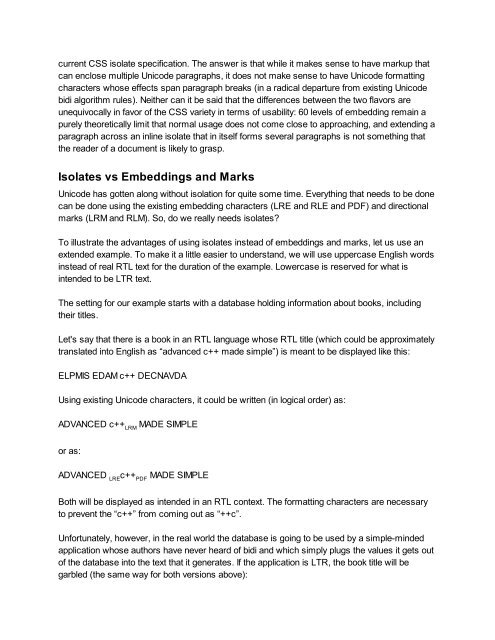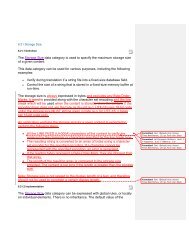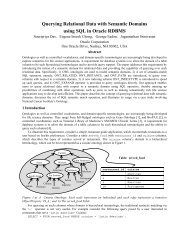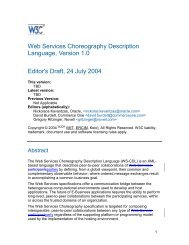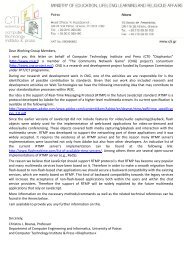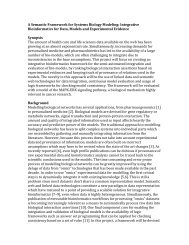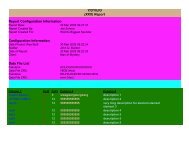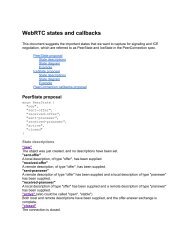A Proposal for Bidi Isolates in Unicode
A Proposal for Bidi Isolates in Unicode
A Proposal for Bidi Isolates in Unicode
Create successful ePaper yourself
Turn your PDF publications into a flip-book with our unique Google optimized e-Paper software.
current CSS isolate specification. The answer is that while it makes sense to have markup that<br />
can enclose multiple <strong>Unicode</strong> paragraphs, it does not make sense to have <strong>Unicode</strong> <strong>for</strong>matt<strong>in</strong>g<br />
characters whose effects span paragraph breaks (<strong>in</strong> a radical departure from exist<strong>in</strong>g <strong>Unicode</strong><br />
bidi algorithm rules). Neither can it be said that the differences between the two flavors are<br />
unequivocally <strong>in</strong> favor of the CSS variety <strong>in</strong> terms of usability: 60 levels of embedd<strong>in</strong>g rema<strong>in</strong> a<br />
purely theoretically limit that normal usage does not come close to approach<strong>in</strong>g, and extend<strong>in</strong>g a<br />
paragraph across an <strong>in</strong>l<strong>in</strong>e isolate that <strong>in</strong> itself <strong>for</strong>ms several paragraphs is not someth<strong>in</strong>g that<br />
the reader of a document is likely to grasp.<br />
<strong>Isolates</strong> vs Embedd<strong>in</strong>gs and Marks<br />
<strong>Unicode</strong> has gotten along without isolation <strong>for</strong> quite some time. Everyth<strong>in</strong>g that needs to be done<br />
can be done us<strong>in</strong>g the exist<strong>in</strong>g embedd<strong>in</strong>g characters (LRE and RLE and PDF) and directional<br />
marks (LRM and RLM). So, do we really needs isolates?<br />
To illustrate the advantages of us<strong>in</strong>g isolates <strong>in</strong>stead of embedd<strong>in</strong>gs and marks, let us use an<br />
extended example. To make it a little easier to understand, we will use uppercase English words<br />
<strong>in</strong>stead of real RTL text <strong>for</strong> the duration of the example. Lowercase is reserved <strong>for</strong> what is<br />
<strong>in</strong>tended to be LTR text.<br />
The sett<strong>in</strong>g <strong>for</strong> our example starts with a database hold<strong>in</strong>g <strong>in</strong><strong>for</strong>mation about books, <strong>in</strong>clud<strong>in</strong>g<br />
their titles.<br />
Let's say that there is a book <strong>in</strong> an RTL language whose RTL title (which could be approximately<br />
translated <strong>in</strong>to English as “advanced c++ made simple”) is meant to be displayed like this:<br />
ELPMIS EDAM c++ DECNAVDA<br />
Us<strong>in</strong>g exist<strong>in</strong>g <strong>Unicode</strong> characters, it could be written (<strong>in</strong> logical order) as:<br />
ADVANCED c++ LRM<br />
MADE SIMPLE<br />
or as:<br />
ADVANCED LRE<br />
c++ PDF<br />
MADE SIMPLE<br />
Both will be displayed as <strong>in</strong>tended <strong>in</strong> an RTL context. The <strong>for</strong>matt<strong>in</strong>g characters are necessary<br />
to prevent the “c++” from com<strong>in</strong>g out as “++c”.<br />
Un<strong>for</strong>tunately, however, <strong>in</strong> the real world the database is go<strong>in</strong>g to be used by a simple-m<strong>in</strong>ded<br />
application whose authors have never heard of bidi and which simply plugs the values it gets out<br />
of the database <strong>in</strong>to the text that it generates. If the application is LTR, the book title will be<br />
garbled (the same way <strong>for</strong> both versions above):


